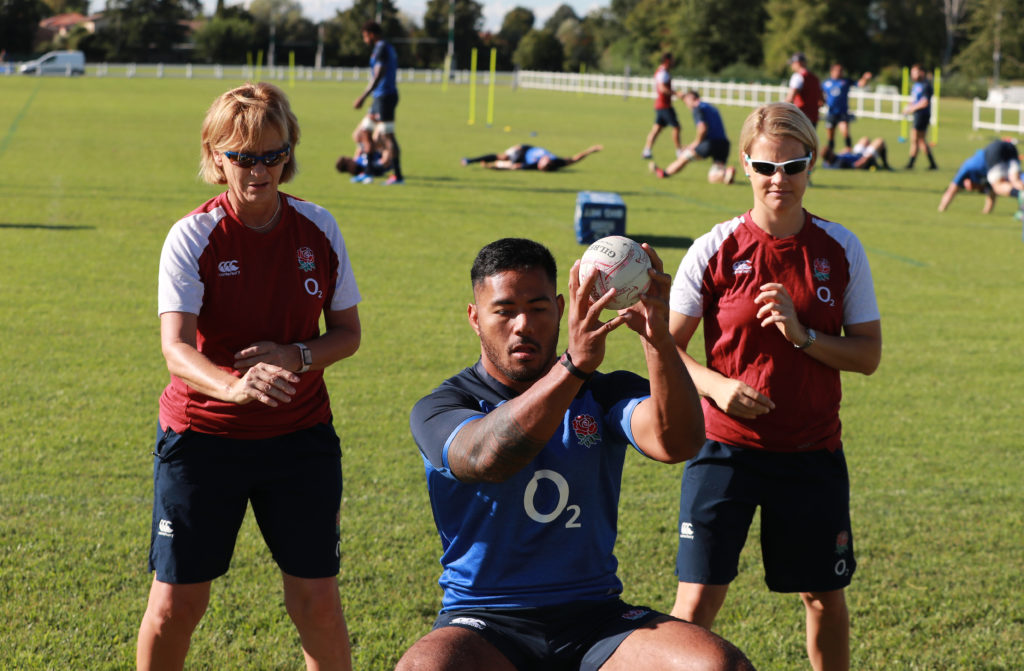Two-time World Cup-winner Sherylle Calder says that the speed of the contest in Japan will place new emphasis on space identification and decision-making. JON CARDINELLI reports.
The sport scientist and performance coach has worked closely with the All Blacks, the Australian Test cricket side, golfer Ernie Els and various other elite teams and athletes over the past 30 years. She won the World Cup with England in 2003 and was part of the Springbok group that lifted the Webb Ellis Cup in 2007.
Most South African fans will remember the ‘Eye Lady’ for her work with Bok wing Bryan Habana, who equalled Jonah Lomu’s try-scoring record at the 2007 World Cup. Habana went on to thank Calder for making his eyes as fast as his feet.
Calder has been on the England coaching staff for the past three years. If all goes to plan for Eddie Jones’ side over the next month or so, Calder will collect her third World Cup medal and consolidate her place among the tournament greats.
‘I’m glad that I’ve had an extended opportunity to work with the players,’ Calder told SARugbymag.co.za. ‘The more you work with someone the more you can increase the impact that you have on their performance.
‘Look at Henry Slade and Jonny May, who are starting to intercept a lot more. Jonny, in particular, has improved so much. He had a great Six Nations campaign.
‘It comes down to timing as well as identifying space,’ she added. ‘I worked with the Boks for four years and every player from Os du Randt to Bryan Habana made a significant improvement. What set those individuals and that team apart was their timing across the board, from their tackling to their high-ball receipts to their passing to their running lines.’
The game has come a long way since England won the World Cup in 2003. Calder remembers a time when coach Clive Woodward kept her away from the media as if she were a secret weapon. By 2007, Calder and her methods were more well known.
Nowadays, every team understands the importance of training skills and awareness. Coaches, players and even fans have come to appreciate what it takes to break down sophisticated defence systems. The phrase ‘identifying space’ is commonplace.
Calder trains players – forwards as well as backs – to excel in this department.
‘We’ve improved prop Mako Vunipola’s handling and reaction time drastically,’ she said. ‘How many times do we see players collecting those tip or pop passes when a team is on the attack or those sharp passes close to the tryline?
‘On the other hand, we also see examples of tight forwards knocking on in those situations. The way the game has evolved, those skills have become all-important for players 1 to 15. The game is also much quicker than it was 10 years ago.’
Calder doesn’t hesitate when asked where the World Cup in Japan will be won and lost.
‘Decision-making and smart thinking under pressure is going to decide this World Cup,’ she said.
‘It’s a trainable skill. There’s nowhere to go these days with defences pushing up so quickly. You have to be able to identify space and make a decision based on what you see. When you train under pressure it becomes second nature.
‘It’s the same with defence. You should be looking for a possible intercept or a way to turn defence into attack.
‘When Bryan Habana made that intercept against Argentina in the 2007 World Cup semi-final, I knew that we had a good chance of winning the final. The timing was so on point.
‘The South Africans were just so in sync. Opposition teams started to worry about passing because they knew that the Boks could punish them in that manner, with Bryan and Jean de Villiers lurking.’
The full interview with Sherylle Calder will be available in the October issue of SA Rugby magazine, on sale this Monday.
Photo: David Rogers/Getty Images





